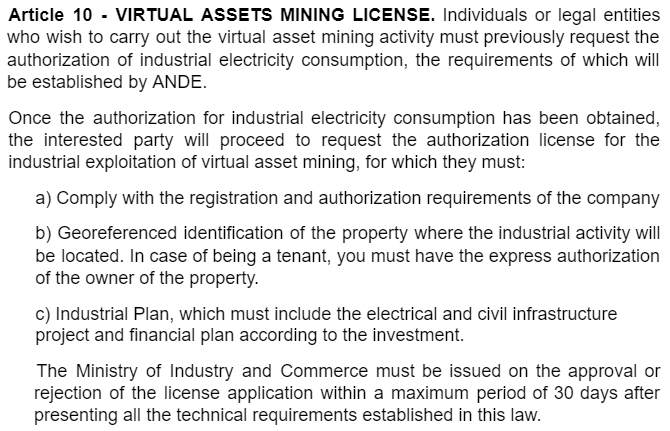In a WhatsApp conversation I had with Paraguayan Congressman Carlitos Rejala, he shared the draft of a bill meant to regulate Bitcoin in Paraguay.
“With this we want to welcome the innovation of cryptocurrencies in Paraguay to the world,” Rejala said over WhatsApp. “This is the result of a very strong and arduous teamwork of many experts in the field, both local and foreign.”
A translated version of the bill proposal refers to bitcoin and other cryptocurrencies as “virtual assets,” “cryptoactive,” and “cryptocurrency.”
This bill was eight pages long, filled with 22 articles, which was worked on in conjunction with Senator Silva Facetti. This bill is much longer than the bill El Salvador voted into law recently, recognizing bitcoin as legal tender, which didn’t include as many individual regulations.
This proposed bill suggests Paraguay’s legislators are seeking tight control over Bitcoin mining in the country, attempting to offer investor protection from bitcoin businesses and specifically indicating that bitcoin is not recognized as legal tender in the country.
The Bill Wants To Require Bitcoin Mining Licenses
As mentioned in “Article 5,” a proposed virtual asset mining license, granted by the Powers of The Ministry of Industry And Trade (MIC), would be required for any entity mining bitcoin. “Article 10” goes into more detail, stating that those who want to mine bitcoin must “request the authorization of industrial electricity consumption.” Then after that has been obtained, they can then “request the authorization license for the industrial exploitation” for bitcoin mining.
The Bill Wants To Protect Bitcoin Investors
“Article 11” states that those providing the sales of bitcoin are prohibited from “selling, assigning or transferring their property, giving as a loan or guarantee, or affecting the use and enjoyment of the Virtual Assets that they manage or guard for third parties without the express authorization of the owner.”
This would seemingly protect bitcoin investors whose private keys are in the possession of a business like an exchange or bank from having their bitcoin fractionally reserved or otherwise used without their consent.
The Bill Would Recognize Bitcoin As Property, Not Legal Tender
“Article 3” of the bill defines bitcoin as property, as it is defined in many other countries, reassuring that it can officially be bought, sold and licensed. And “Article 14” clarified that bitcoin would not be recognized as legal tender, stating that: “The Virtual Assets trading entities must inform the acquirer of the trading conditions with Virtual Assets, expressly notifying that the virtual assets are not recognized as legal tender, therefore, they are not backed by the Central Bank of Paraguay.”
